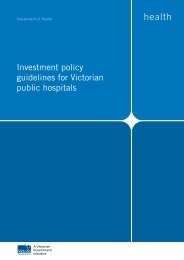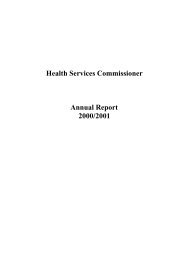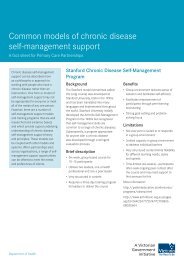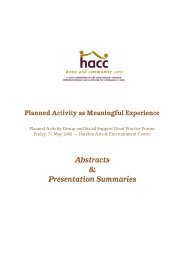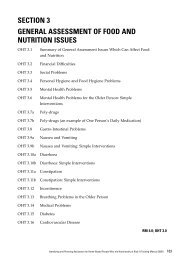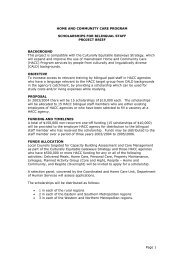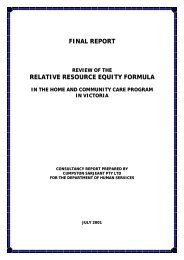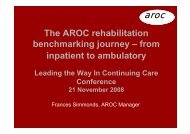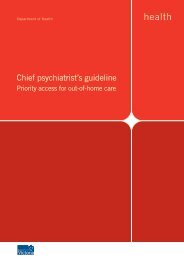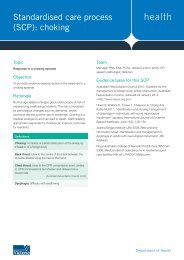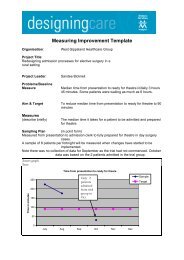Chief Psychiatrist's annual report 2008-09 - Department of Health
Chief Psychiatrist's annual report 2008-09 - Department of Health
Chief Psychiatrist's annual report 2008-09 - Department of Health
You also want an ePaper? Increase the reach of your titles
YUMPU automatically turns print PDFs into web optimized ePapers that Google loves.
<strong>Chief</strong> Psychiatrist’s <strong>annual</strong> <strong>report</strong> <strong>2008</strong>–<strong>09</strong> 37<br />
8 Forensic mental health<br />
Forensic mental health services are provided to mentally ill <strong>of</strong>fenders or to those consumers who<br />
present a serious risk <strong>of</strong> <strong>of</strong>fending behaviour. Courts can make specified orders when determining<br />
the most appropriate disposition for a person where mental illness has played a role in the<br />
<strong>of</strong>fending behaviour. Instead <strong>of</strong> a sentence, or by way <strong>of</strong> a sentence, a court may direct a person to<br />
receive treatment as an involuntary patient in an approved mental health service.<br />
In Victoria, forensic mental health services are provided through the Victorian Institute <strong>of</strong> Forensic<br />
Mental <strong>Health</strong> (Forensicare) and are located within the prison system, in a specialist forensic<br />
mental health hospital (Thomas Embling Hospital) and the community-based forensic mental health<br />
service in Clifton Hill. The <strong>Chief</strong> Psychiatrist is a member <strong>of</strong> the external advisory group providing<br />
support to a large research program carried out under the auspices <strong>of</strong> Forensicare.<br />
The <strong>Chief</strong> Psychiatrist has a range <strong>of</strong> responsibilities for mentally ill <strong>of</strong>fenders under the Mental <strong>Health</strong><br />
Act and the Crimes (Mental Impairment and Unfitness to be Tried) Act.<br />
8.1 Restricted involuntary treatment orders, hospital orders<br />
and restricted community treatment orders<br />
The Sentencing and Mental <strong>Health</strong> Acts (Amendment) Act made significant changes to the<br />
provisions governing hospital orders, hospital security orders and restricted community treatment<br />
orders, effective from 1 October 2006. Essentially the amendments replaced hospital orders with<br />
a new order known as a restricted involuntary treatment order (RITO), which can only be made<br />
for a maximum <strong>of</strong> two years for people found guilty <strong>of</strong> a non-serious <strong>of</strong>fence. Special transition<br />
arrangements were made for those patients on existing hospital orders at 1 October 2006, as these<br />
orders were deemed to expire on 1 October <strong>2008</strong>.<br />
When the court makes a person subject to a RITO, the person must be taken to and detained in a<br />
mental health service as an inpatient. When the person’s condition has improved to the extent that<br />
they can be treated and managed safely in the community, the authorised psychiatrist may make a<br />
restricted community treatment order (RCTO) enabling the person to continue their treatment in the<br />
community. The authorised psychiatrist must notify the <strong>Chief</strong> Psychiatrist <strong>of</strong> the making <strong>of</strong> an RCTO 19 .<br />
In <strong>2008</strong>–<strong>09</strong>, 10 RITOs and 12 RCTOs were made under the new provisions (compared to 19 RITOs<br />
and 21 RCTOs in 2007–08).<br />
8.2 Security patients<br />
Security patients are those detained in an approved mental health service for treatment <strong>of</strong><br />
their mental illness, either on a court order under the Sentencing Act (s.93(1)(e)) as part <strong>of</strong> their<br />
sentence, or by order <strong>of</strong> the Secretary <strong>of</strong> the <strong>Department</strong> <strong>of</strong> Justice under the Mental <strong>Health</strong> Act<br />
(s.16). In Victoria, such patients receive treatment and care for their mental illness in Thomas<br />
Embling Hospital (a secure specialist forensic mental health facility) until it is appropriate for them<br />
to be returned to prison or to the community if they have reached the end <strong>of</strong> their sentence.<br />
19 For further information see program management circulars: Sentencing and Mental <strong>Health</strong> Acts (Amendment)<br />
Act 2005: Summary <strong>of</strong> key amendments, Changes to hospital orders under the Sentencing Act 1991 and Restricted<br />
involuntary treatment orders and restricted community treatment orders.



